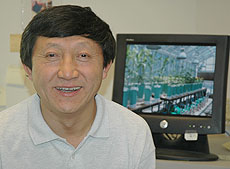November 13, 2006
Soil ecologist’s work on carbon cycling attracts USDA support
By Jennifer McNulty
Soil scientist Weixin Cheng, associate professor of environmental studies, is a roots-and-rocks kind of guy whose research focuses on the above- and below-ground movement of carbon in terrestrial ecosystems.

Weixin Cheng
Photo: Jennifer McNulty
|
Cheng’s work has the potential to improve land management practices, aid the development of sustainable agroecosystems, and increase resource efficiency. It has also recently attracted the attention of the U.S. Department of Agriculture’s Cooperative State Research, Education and Extension Service, which has awarded Cheng a $455,000 research grant from the National Research Initiative.
The grant will advance Cheng’s investigation of how plant roots impact the carbon-cycling process. His research findings can assist land managers who are developing strategies to store more carbon in the soil to counteract global warming.
Cheng’s research explores the way the rhizosphere--the soil surrounding plant roots--influences nutrient dynamics and the decomposition of organic matter.
To overcome methodological difficulties, Cheng developed a continuous carbon-13 labeling system. The USDA-funded project will build on that work to study how temperature and moisture control rhizosphere-associated soil decomposition, nitrogen mineralization, and nitrogen competition between plant roots and soil microorganisms.
He plans to test three hypotheses: The first hypothesis explains how plant roots compete with soil microorganisms for available nitrogen by exuding labile carbon to the rhizosphere. The second hypothesis postulates that soil warming intensifies rhizosphere effects on the decomposition of soil organic matter because the higher soil microbial biomass turnover rate and the enhanced extracellular enzyme production under warmer conditions form a positive feedback with plant growth and carbon input from roots. The third hypothesis identifies transpiration-induced wetting and drying cycles in the rhizosphere as an important mechanism that causes accelerated rates of microbial turnover, soil organic matter decomposition, and nitrogen mineralization.